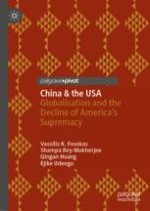2021 | OriginalPaper | Buchkapitel
2. The Vulnerability of the American Empire-State
verfasst von : Vassilis K. Fouskas, Shampa Roy-Mukherjee, Qingan Huang, Ejike Udeogu
Erschienen in: China & the USA
Aktivieren Sie unsere intelligente Suche, um passende Fachinhalte oder Patente zu finden.
Wählen Sie Textabschnitte aus um mit Künstlicher Intelligenz passenden Patente zu finden. powered by
Markieren Sie Textabschnitte, um KI-gestützt weitere passende Inhalte zu finden. powered by
